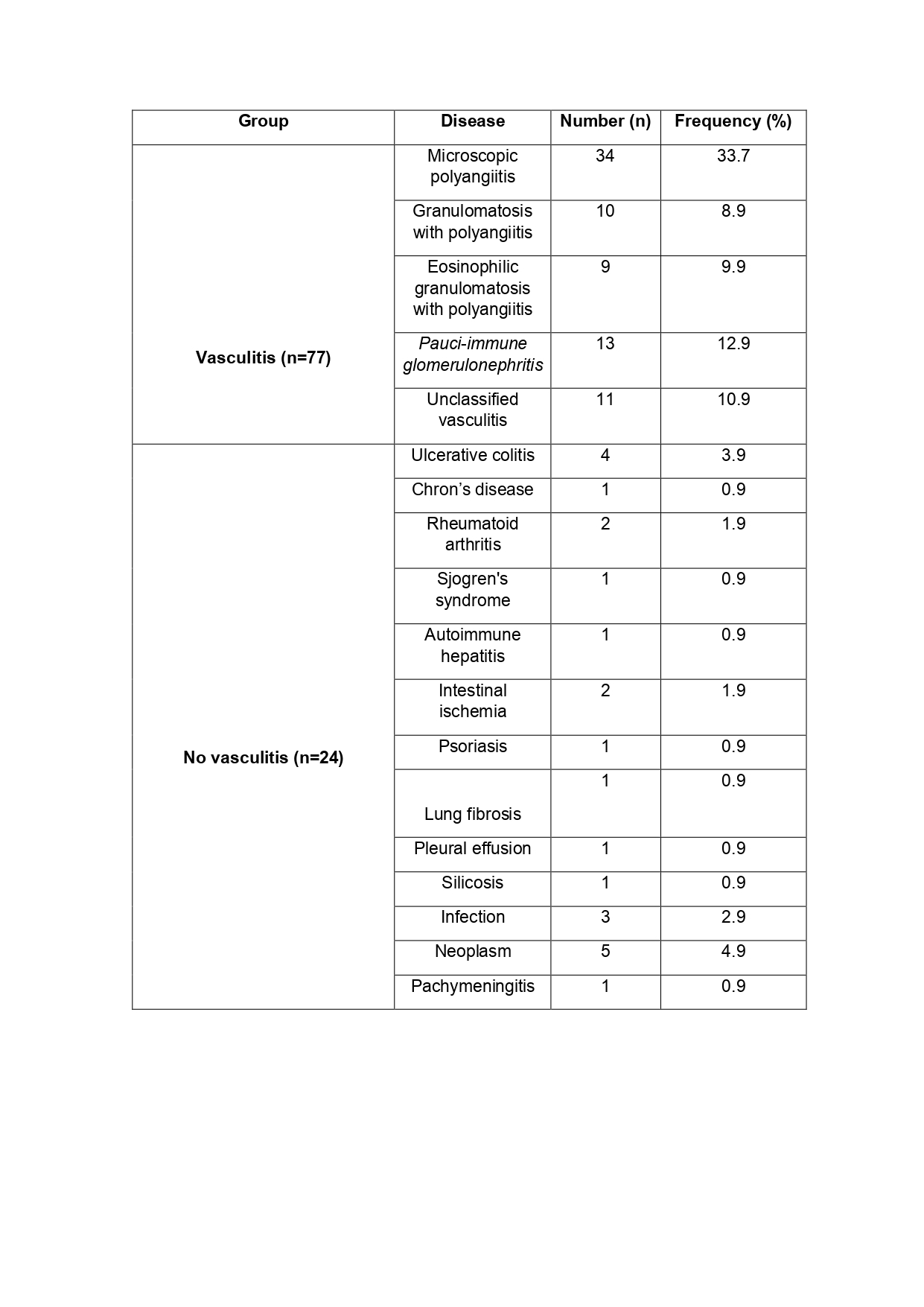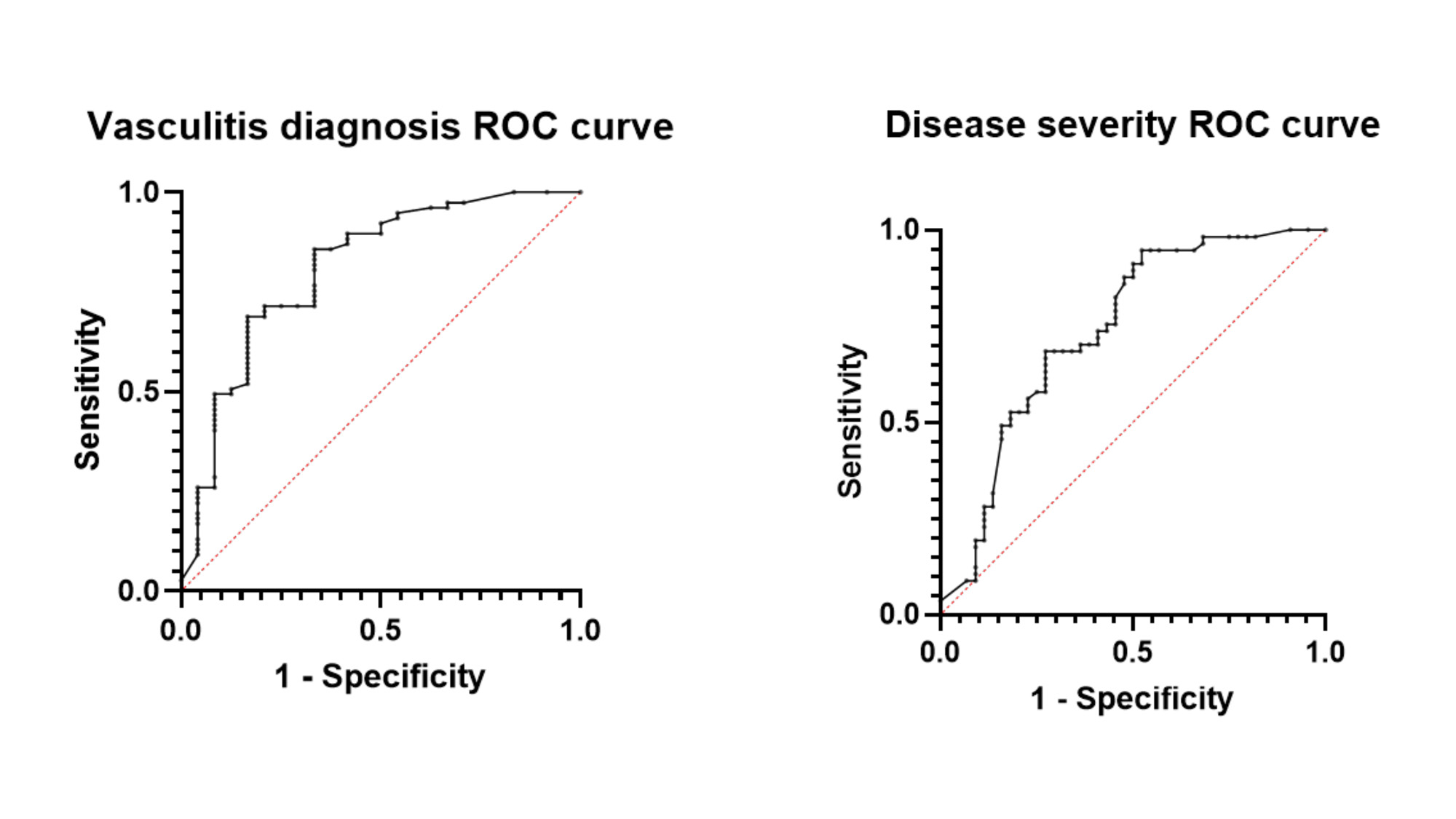Session Information
Date: Monday, November 13, 2023
Title: (1124–1154) Miscellaneous Rheumatic & Inflammatory Diseases Poster II
Session Type: Poster Session B
Session Time: 9:00AM-11:00AM
Background/Purpose: ANCA-associated vasculitis (AAV) is a group of pathologies characterized by necrotizing inflammation that mainly affects small and medium-sized vessels. Serum anti-neutrophil cytoplasmic antibodies (ANCA), mainly anti-myeloperoxidase (anti-MPO) and anti-proteinase 3, levels may correlate to severity and prognosis of the disease. Our objective was to identify the diseases associated with positive anti-MPO antibodies detected in a single university hospital and attempt to establish whether there is a cut-off point that correlates anti-MPO antibody levels with disease severity and prognosis.
Methods: Table 1 summarizes the frequency of positive anti-MPO antibodies, using laboratory established cut-off value, in different diseases based on a retrospective investigation of 101 positive anti-MPO antibody patients. Then, anti-MPO specificity to vasculitis was evaluated. Furthermore, data of renal disease (hematuria and/or proteinuria) and pulmonary involvement (hemoptysis, asthma and/or respiratory insufficiency) were collected at vasculitis diagnosis, as well as whether the illness progressed to the stage of requiring dialysis, transplantation, or mortality.
Results: For anti-MPO antibodies with a diagnosis of vasculitis (n=77), an area under the curve (AUC) was calculated (AUC=0.8084), and a cut-off point of 41.5 IU/ml was determined (Figure 1). When the analysis was restricted to exclusively microscopic polyangiitis diagnoses (n=34), the cut-off point was 36.5 IU/ml with an AUC of 0.6435. There were significant differences in anti-MPO levels between patients with renal or pulmonary dysfunction (n=65) versus those without them (n=36) (p=0.0003), and a cut-off threshold of 60 IU/ml was established. Finally, after evaluating the illness’s prognosis, an AUC= 0.5546 was found, being no significant differences between those patients who had a worse disease progression (n=19) and those who did not (n=82) (p=0.4643).
Conclusion: Anti-MPO levels at the moment of vasculitis diagnosis are related with disease severity but not with disease outcome.
To cite this abstract in AMA style:
Benavides F, Renuncio-García M, Al Fazazi S, escagedo Cagigas c, rodriguez Vidriales m, Calvo Río V, Irure-Ventura J, martin penagos l, Lopez-Hoyos M, Blanco R. Relation Between Positive MPO-ANCA Antibodies And: Associated Diseases, Anca-associated Vasculitis Specificty, Severity and Prognosis. Study from a Single University Hospital [abstract]. Arthritis Rheumatol. 2023; 75 (suppl 9). https://acrabstracts.org/abstract/relation-between-positive-mpo-anca-antibodies-and-associated-diseases-anca-associated-vasculitis-specificty-severity-and-prognosis-study-from-a-single-university-hospital/. Accessed .« Back to ACR Convergence 2023
ACR Meeting Abstracts - https://acrabstracts.org/abstract/relation-between-positive-mpo-anca-antibodies-and-associated-diseases-anca-associated-vasculitis-specificty-severity-and-prognosis-study-from-a-single-university-hospital/


